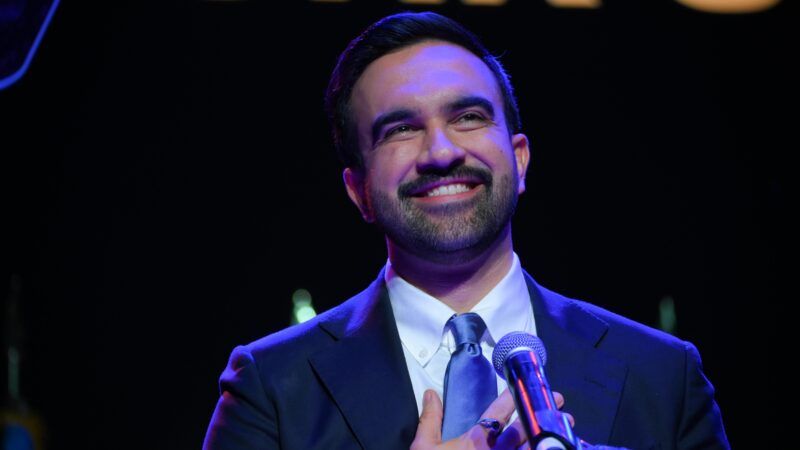Mamdani Claims 'Mandate' for Bigger Government: 'There Is No Problem Too Large for Government To Solve'
Zohran Mamdani's message was, to quote a former president, "I'm from the government, and I'm here to help."

On Tuesday, November 4, Zohran Mamdani clinched the election for mayor of New York City, capturing just over 50 percent of the vote in a four-way race. Mamdani, a member of the New York State Assembly, defeated candidates with considerably more name recognition, including incumbent Mayor Eric Adams and former Gov. Andrew Cuomo—each of whom he also previously defeated in the Democratic Party primary.
Unfortunately, Mamdani's win seems to vindicate the progressive theory—despite all recent evidence to the contrary—that the only solution to America's problems is more government.
To be clear, there are certainly things to like about the mayor-elect. At 34 years old, he is not only the city's first millennial mayor, but he was the only candidate in the race not currently eligible for Social Security. (Adams and Cuomo are 65 and 67, while Republican candidate Curtis Sliwa is 71.) In an era of increasing gerontocratic rule, a mayor in his mid-30s seems like a breath of fresh air.
For that matter, there's something innately positive about voters rebuking both an incumbent with damning allegations of corruption as well as an entitled political scion who was drummed out of higher office in recent memory as a consequence of both his personal behavior and his official actions.
And to be honest, it's rather inspiring for Mamdani, a Ugandan-born man of Indian descent, to be elected the first immigrant mayor of New York City, whose population is nearly 40 percent foreign-born.
Then again, it should come as no surprise that a Mamdani win could vex libertarians. For one, he is an unabashed democratic socialist—while a member of the New York State Assembly, the Democratic Socialists of America (DSA) claimed him as one of its nine "New York state socialists in office." (Mamdani did distance himself from the DSA's national platform after winning the Democratic Party's nomination.)
Mamdani left no room for misunderstanding in his victory speech. In its first full sentence, he quoted Eugene Debs, founding member of the Socialist Party of America and a five-time candidate for president under its banner.
"New York, tonight you have delivered," Mamdani continued. "A mandate for change. A mandate for a new kind of politics. A mandate for a city we can afford. And a mandate for a government that delivers exactly that."
Later in the speech, he doubled down: "We will prove that there is no problem too large for government to solve, and no concern too small for it to care about. For years, those in City Hall have only helped those who can help them. But on January 1st, we will usher in a city government that helps everyone."
Mamdani's message was, to quote a former president, "I'm from the government, and I'm here to help."
It's perhaps an unsurprising result, but given where both the country and the Democratic Party are right now, it's nonetheless dispiriting. After all, the day after the election, President Donald Trump's administration argued before the U.S. Supreme Court that no matter what the Constitution says, the president should be able to set tariff rates with other countries at his whim. The court may also weigh in on birthright citizenship, a right guaranteed in the Constitution but that Trump declared null and void in a January 2025 executive order, throwing state agencies into disarray.
And that's just scratching the surface of the president's many overreaches. On the same day New Yorkers elected Mamdani, U.S. Secretary of Defense Pete Hegseth announced the Trump administration had bombed a boat in the Pacific Ocean, killing two people onboard—the latest in a campaign that has now killed over 50 people the administration deems "narcoterrorists," without evidence or due process.
Many people, including those on the left, have opposed Trump's actions, which have expanded the role of government past any sensible point. Last month, millions took to the streets in "No Kings" protests, comparing Trump's actions to the exact sort of monarchical rule the Founding Fathers formed this country in order to escape.
And yet Mamdani's win, and his overt pro-government rhetoric, suggests this was not a purely nonpartisan desire. To progressives like Mamdani, government overreach is a problem only to the extent that it's overreaching in the wrong direction.
